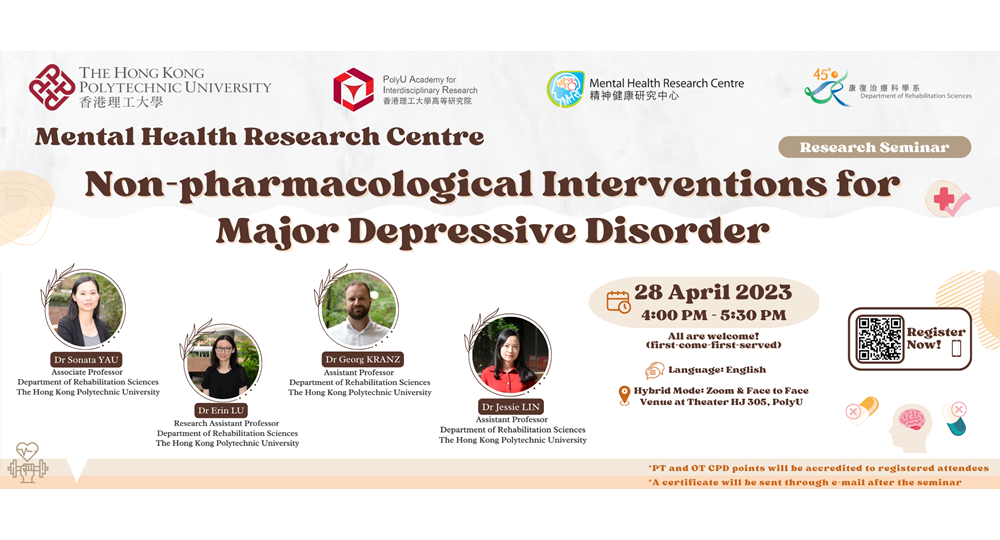精神健康研究中心於 2023 年 4 月 28 日舉辦研討會 (只有英文版本)
會議/講座

-
日期
2023年4月28日
-
主辦單位
Mental Health Research Centre
-
時間
16:00 - 17:30
-
地點
Hybrid Mode: HJ305, 3/F, Core H, PolyU & Online via Zoom
查詢
Ms Carol Yau 2766 4445 carol-mui.yau@polyu.edu.hk
備註
Registration starts at 3:45 pm
摘要
Enjoy free admission, all are welcome.
* Seats are limited and will be allocated on a 'first in, first served' basis.
* Online link will be provided if the seats are full.
* CPD points will be accredited to registered attendees, for Physiotherapy (PT) and Occupational Therapy (OT) only.
* A PT and OT CPD certificate will be sent through email after the seminar.
Topic: Non-pharmacological Interventions for Major Depressive Disorders
Wash off depression by physical exercise: mechanistic insights from animal research
Speaker: Dr Sonata Yau, Associate Professor, Department of Rehabilitation Sciences, PolyU
Abstract:
Depressive disorders are one of the leading causes of disability worldwide. Physical exercise is the most potent antidepressant. However, it is always underutilized, partly due to challenges in having exercise prescription with therapeutic dosages for different individuals and its largely unclear underlying mechanisms. This talk will summarize mechanistic insights from animal studies showing possible neuro-mechanisms underlying the antidepressant effects of physical exercise via promoting hippocampal neuroplasticity.
Cross-diagnostic effects of transcranial magnetic brain stimulation on depressive symptoms
Speaker: Dr Georg Kranz, Assistant Professor, Department of Rehabilitation Sciences, PolyU
Abstract:
There is an emerging field in psychiatry on diagnostic and therapeutic tools that cross traditional nosological boundaries. Repetitive transcranial magnetic stimulation (rTMS) of the left dorsolateral prefrontal cortex is a therapeutic intervention that has been cross-diagnostically applied. An abundance of efficacy data is available from clinical trials using this technique to treat symptoms that present across diagnoses. Dr. Kranz will present resent work from his lab, which assessed the therapeutic efficacy of rTMS on clinical measures for emotional, behavioural, and cognitive symptoms irrespective of diagnosis, reporting a pattern of domains where rTMS shows its effects.
Qigong as a treatment for depressive symptoms: effectiveness and mechanisms
Speaker: Dr Erin Lu, Research Assistant Professor, Department of Rehabilitation Sciences, PolyU
Abstract:
Qigong is a form of mind-body exercise with interlinking body movement, focused attention, and coordinated breathing. Given its safety and low cost, qigong is a promising complementary and alternative therapy for people with depressive symptoms. Various forms of health qigong have been found to effectively alleviate depressive symptoms in different patient groups and healthy adults. Qigong may regulate activity of the hypothalamic-pituitary-adrenal (HPA) axis to reduce cortisol levels and increases peripheral adiponectin levels, which in turn, enhance trophic factor signaling and up-regulate brain-derived neurotrophic factor (BDNF). A randomized controlled trial is ongoing to test the neurobiological mechanisms of the antidepressant effect of qigong.
Antidepressant effects of mindfulness-based interventions on postpartum depression
Speaker: Dr Jessie Lin, Assistant Professor, Department of Rehabilitation Sciences, PolyU
Abstract:
Postpartum depression (PPD) is a common mood disorder and the consequences are extensive for the well-being of both the mothers and the infants. Antidepressants are the first-line treatment for postpartum women with moderate to severe depression, but have limited effects for the mild and subthreshold PPD. We have conducted several RCTs to investigate the antidepressant effects of mindfulness-based interventions on postpartum depression, and encouraging findings were observed that both mindfulness-based intervention and integrated mindful yoga program significantly improved depression and stress in postpartum women. Moreover, mindful yoga has significant beneficial effects on physical functioning compared with active control group. Our preliminary results suggested that easy-learning and self-practice-based intervention (e.g. mindfulness-based intervention) may be an ideal treatment modality providing accessible and sustainable individual care, in particular for women during the maternal stages. The positive outcomes of our studies can be scaled up and incorporated in maternal education and postpartum support services in the community.


